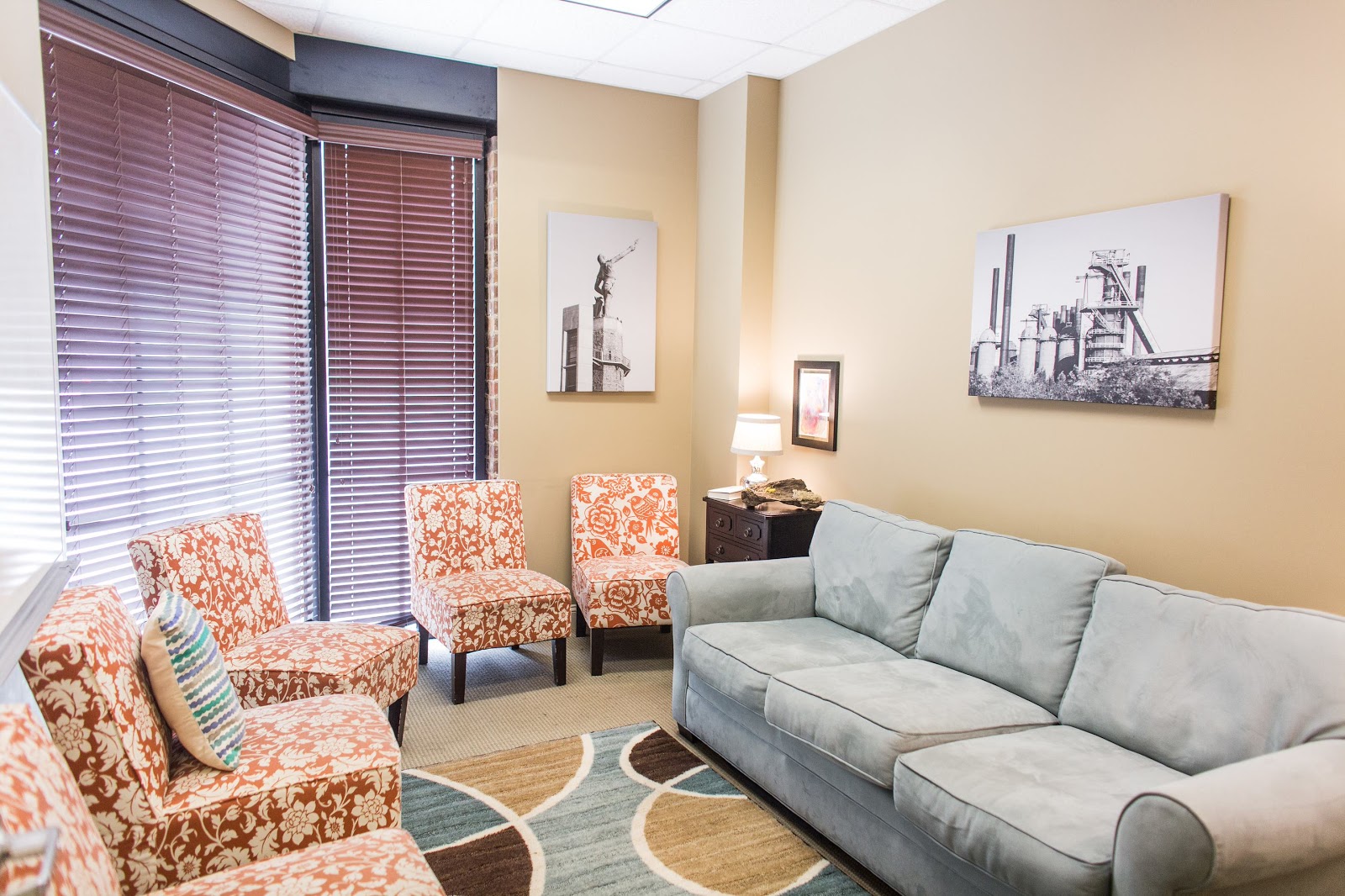The Highlands Treatment Center

Overview
The Highlands Treatment Center is an accredited substance abuse treatment center that provides inpatient and outpatient detoxification, for men and women from 18+ years of age. As part of their special programs, The Highlands Treatment Center treats persons with eating disorders and clients who have experienced trauma. To help patients achieve sobriety, The Highlands Treatment Center provides intake assessments. Afterward, patients receive individual psychotherapy, cognitive behavioral therapy, and dialectical behavior therapy during treatment. The Highlands Treatment Center is located in Birmingham, Alabama, providing treatment for people in Jefferson County, accepting cash or self-payment and private health insurance.
The Highlands Treatment Center at a Glance
Payment Options
- Cash or self-payment
- Private health insurance
Assessments
- Comprehensive mental health assessment
- Comprehensive substance use assessment
Age Groups
- Young adults
- Adults
Operation
- Private for-profit organization
Accreditations
The Joint Commission:

The Joint Commission accreditation for addiction and behavioral health is a prestigious recognition signifying a facility's commitment to delivering high-quality care and safety for individuals dealing with substance abuse and mental health issues. It involves rigorous evaluations and assessments, ensuring patients receive evidence-based treatment and exceptional care. This accreditation demonstrates a facility's dedication to continuous improvement and ethical practices, building trust among patients and healthcare professionals seeking top-tier addiction and behavioral health services.
Commission on Accreditation of Rehabilitation Facilities (CARF):

CARF accreditation is a prestigious recognition for organizations in rehabilitation and human services. It signifies that an organization meets rigorous quality standards and is committed to providing top-notch care. Achieving CARF accreditation involves a thorough evaluation process, including on-site surveys, to ensure excellence in programs and services. This accreditation boosts an organization's credibility, assures clients and funders of quality, and promotes ongoing improvement in the field of rehabilitation and human services.
Treatment At The Highlands Treatment Center

Conditions Treated
Mental health treatment:
Mental health facilities offer a safe space for individuals to get specialized care. Trained experts create personal plans using therapies, possibly including medication. The goal is to help individuals cope better and lead fulfilling lives, with constant support and a community feel.
Alcoholism:
Alcohol addiction is a health problem where drinking takes control over a person's life. It affects how their brain thinks and acts, leading to strong desires to drink, bad feelings, sudden actions, and discomfort when not drinking. To help someone with this problem, there are treatments like detox, counseling, group support, and learning coping methods. While treatment can't completely cure the urge to drink, it helps people regain control of their lives and feel better overall.
Opioid Addiction:
Opioid rehabilitation centers are dedicated to assisting individuals overcoming opioid dependence. They cater to those battling addiction from illicit opioids such as heroin, as well as those addicted to prescription medications like oxycodone. These facilities may provide a holistic approach that encompasses both physical care, which often involves medical detox and ongoing medical assistance (including medications), and psychological care through comprehensive therapy to tackle the root causes of addiction.
Substance use treatment:
Substance use rehabilitation represents a holistic treatment strategy tailored to aid individuals grappling with drug or alcohol addiction. This comprehensive rehabilitation method encompasses two key aspects: first, addressing the physical dependency, often commencing with detoxification, and second, tackling the psychological triggers through a range of therapeutic techniques. The ultimate aim is to empower individuals to attain and sustain sobriety while providing them with the necessary skills and coping mechanisms to successfully reintegrate into society and lead a life free from substance abuse.
Co-occurring Disorders:
Dual-diagnosis rehabilitation centers often offer the most suitable approach for addressing concurrent mental health and substance abuse issues. These facilities typically employ a team of medical and behavioral specialists who utilize a variety of interventions and create a conducive healing environment to support your journey toward lasting recovery. Their comprehensive treatment approach typically encompasses evidence-based therapies such as cognitive-behavioral therapy, recovery support meetings, 12-step facilitation, psychoeducation, skills training, and group therapy to help you achieve and maintain long-term wellness.

Levels Of Care
Intensive outpatient treatment:
Intensive Outpatient (IOP) is a specialized level of care aimed at assisting those on their recovery journey from addictions or mental health disorders. Unlike the inpatient or residential treatments where attendees reside within the facility, IOP offers a robust therapeutic experience while enabling participants to stay home and continue their daily routines. Generally, individuals in IOP engage in several sessions weekly, clocking in at around 9-20 hours or even more. These sessions encompass individual counseling, group sessions, familial guidance, and instructional classes that equip attendees with the tools and methods to manage symptoms and avert relapses.
Detoxification:
Detoxification, often shortened to detox, is like giving the body a fresh start by getting rid of harmful substances like drugs or alcohol someone may have taken. When a person stops taking these substances, they might feel sick or uncomfortable as their body adjusts to the change. Detox helps ease these uncomfortable feelings while making sure the harmful substances are removed from the body in a safe way. This process helps prevent any additional harm caused by the drugs or alcohol.
Aftercare:
Aftercare treatment refers to the continued support and care that individuals receive following the completion of their primary treatment program for substance abuse or addiction. This phase aims to aid individuals in maintaining their sobriety, improving personal skills and coping strategies, and integrating back into society. Aftercare can include ongoing therapy, support group meetings, education, and monitoring, which are crucial for preventing relapse and promoting long-term recovery. Through a combination of community support, accountability, and personal development, aftercare provides a structured pathway for individuals to continue their recovery journey in a supportive environment.
Halfway house:
A sober living home offers a supportive environment where individuals in recovery provide mutual support as they share household responsibilities. Residents participate in 12-step programs and offer accountability for sobriety. To remain in men’s or women’s sober living, individuals must remain drug and alcohol-free, contribute to chores, attend support group meetings, and help cover expenses to live in the home.
Outpatient:
Outpatient programs cater to individuals who are in good medical condition and are not at a heightened risk of relapse, including those who have successfully finished their inpatient treatment. These programs usually build upon clients' existing treatment strategies, providing ongoing addiction counseling and educational support for recovery. Individuals who enter outpatient care right after detoxification may also undergo medical and psychological evaluations, followed by the creation of personalized treatment plans. Most outpatient rehabilitation centers offer various levels of care tailored to meet each client's specific needs.
Hospital inpatient treatment:
Inpatient treatment involves a comprehensive residential therapeutic program where patients stay on-site for a duration typically ranging from 30 to 90 days. This immersive environment offers structured support, ensuring safety and a focus on recovery. Therapies provided include individual and group counseling, cognitive-behavioral therapy, holistic treatments, family therapy sessions, and experiential therapies. The aim is to address addiction or mental health disorders' physical, emotional, and psychological aspects, laying a robust foundation for sustained healing.

Treatment Modalities
Individual psychotherapy:
In individual therapy, a person engages in a one-on-one session with a qualified therapist or counselor. This therapeutic approach is crucial in successful substance abuse treatment because it delves into the underlying causes of addiction, addressing issues the individual may encounter in their familial, social, and professional or academic environments.
Cognitive Behavioral Therapy:
Cognitive Behavioral Therapy (CBT) is a evidence-based psychological treatment that focuses on identifying and challenging negative thought patterns and behaviors. It aims to develop coping strategies and promote healthier thinking to address a variety of mental health issues, such as depression, anxiety, and stress. CBT is typically short-term and goal-oriented, emphasizing the role of thought processes in influencing emotions and behaviors.
Dialectical Behavior Therapy:
Dialectical Behavior Therapy (DBT) is a cognitive-behavioral approach specifically designed to help individuals regulate emotions, enhance interpersonal effectiveness, develop distress tolerance, and increase mindfulness. In addiction treatment, DBT equips individuals with practical skills to manage triggers, cope with stressors, and build a life worth living without resorting to substance use. By addressing both the emotional and behavioral challenges of addiction, DBT fosters personal growth and long-term recovery.
Nutrition Therapy:
Nutrition therapy is a tailored dietary approach to managing and preventing certain medical conditions. Administered by registered dietitians or nutrition professionals, it involves the assessment of an individual's nutritional status and the development of personalized nutrition strategies to optimize health and manage specific health concerns.
Eye Movement Desensitization and Reprocessing therapy:
Eye Movement Desensitization and Reprocessing (EMDR) Therapy is a psychotherapeutic approach designed to alleviate the distress associated with traumatic memories. Originated by Francine Shapiro in the late 1980s, EMDR involves a structured eight-phase approach where the patient recalls distressing images while receiving bilateral sensory input, typically in the form of guided eye movements. This process allows the brain to reprocess traumatic memories, reducing their emotional charge and helping individuals integrate these memories more adaptively. EMDR is widely recognized for its effectiveness in treating post-traumatic stress disorder (PTSD) and other trauma-related psychological disorders.
Trauma-related counseling:
Trauma therapy addresses the deep-seated emotional and psychological wounds often linked with substance abuse disorders. Recognizing that traumatic experiences can be a root cause or a significant contributing factor to substance addiction, this therapeutic approach seeks to help individuals understand, process, and heal from their traumas. Doing so fosters emotional healing and bolsters the individual's chances of long-term recovery from addiction. Integrating trauma-informed care into addiction treatment ensures a comprehensive approach that addresses substance abuse's symptoms and underlying causes.
Creative Arts Therapy:
Creative Arts Therapy is a therapeutic approach that integrates visual arts, music, drama, dance, and other creative processes to foster self-expression, emotional healing, and personal development. By tapping into the transformative power of the arts, therapists help individuals explore and communicate emotions, navigate challenges, and achieve greater self-awareness. It is suitable for individuals of all ages and offers a unique, non-verbal avenue to address psychological and emotional needs.
Family counseling:
Family Counseling is a therapeutic approach that seeks to address and improve communication, understanding, and dynamics within a family unit. By addressing conflicts, emotional distress, and behavioral challenges, a trained therapist provides guidance and tools for family members to strengthen bonds, resolve issues, and foster a healthier family environment.
Life Skills:
Life skills training encompasses a comprehensive set of abilities essential for individuals to thrive in society. These encompass time management, career guidance, financial acumen, and effective communication. In the context of addiction recovery, true success goes beyond mere abstinence; it's about flourishing. Life skills instruction equips individuals with the practical tools needed to navigate society successfully, paving the way for a fulfilling life and, consequently, lasting sobriety.
Eating Disorder Treatment:
Eating Disorder Treatment is a specialized approach to help individuals struggling with disordered eating patterns. It involves therapies, counseling, and medical monitoring by a team of professionals to promote recovery, address underlying causes, and improve overall well-being. The goal is to establish a healthier relationship with food and self-image, facilitating long-term recovery and well-being.
Ancillary Services
Special Programs
- Persons with eating disorders
- Clients who have experienced trauma

Additional Locations
Contact Information
DISCLAIMER: The facility name, logo and brand are the property and registered trademarks of The Highlands Treatment Center, and are being used for identification and informational purposes only. Use of these names, logos and brands shall not imply endorsement. BetterAddictionCare.com is not affiliated with or sponsored by The Highlands Treatment Center.



